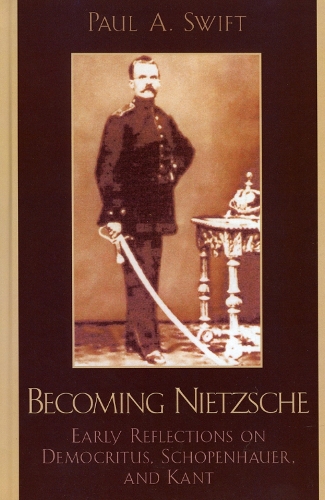
Becoming Nietzsche: Early Reflections on Democritus, Schopenhauer, and Kant
(Paperback)
Publishing Details
Becoming Nietzsche: Early Reflections on Democritus, Schopenhauer, and Kant
By (Author) Paul A. Swift
Bloomsbury Publishing PLC
Lexington Books
26th March 2008
United States
Classifications
Physical Properties
Paperback
146
Width 155mm, Height 229mm, Spine 12mm
227g
Description
Becoming Nietzsche is an essential book for understanding Nietzsche's philosophical genealogy from 1866 to 1868, a phase that is punctuated by the influence of Friedrich Lange and a surprising rejection of Schopenhauer's theory of the will. During this phase, Nietzsche focuses on the scientific and artistic status of teleological judgments and their relevance for thinking about organic life and representation. Paul A. Swift deftly connects Nietzsche's philology with the development of his theory of human understanding by providing scholarly analysis and short original translations of Nietzsche's early work on Democritus, Schopenhauer, and Kant. A first of its kind study suitable for Nietzsche specialists, historians of philosophy, and newcomers who have broad interests in the humanities, Becoming Nietzsche investigates how Democritus's rejection of teleology and Kant's analysis of reflective judgment directly influenced Nietzsche's aesthetic perspectivism in the 1860s.
Reviews
Paul Swift's Becoming Nietzsche is an important contribution to Nietzsche studies, emphasizing his earliest encounter with Democritus, Schopenhauer, and Kant. Swift ably discusses Nietzsche's response to many of their ideas and concepts relating to, for example, teleology and metaphysics. Swift brings to the fore problems and texts by the early Nietzsche which have received far too little attention previously. -- Thomas H. Brobjer, Uppsala University, Sweden
Swift's monograph makes a valuable contribution to our understanding of Nietzsche's philosophical genealogy tout court. Swift demonstrates beyond reasonable doubt the importance to Nietzsche's later philosophical campaigns of this early period in his development. -- October 2006 * H-German *
Swift focuses much welcome and needed attention on the still much neglected earliest philosophical writings by Nietzsche. -- James I. Porter, author of The Invention of Dionysus: An Essay on the Birth of Tragedy and Nietzsche and the Philology of the Future
Author Bio
Paul A. Swift is a lecturer at Bryant University.
